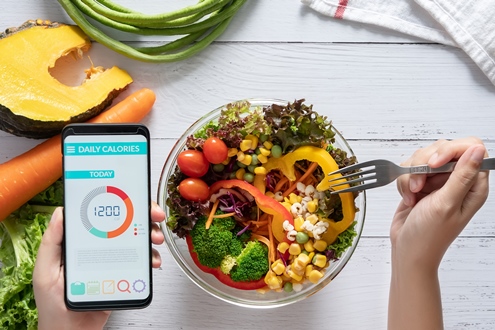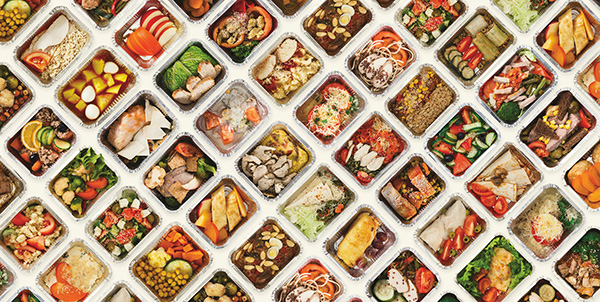A recent British poll found that the average 45-year-old woman has been on more than 60 diets in her life, yet she still weighs more than she did at 25. Similarly, an ABC News poll reported that there are 108 million Americans dieting at any given time (85% are women) and each of these dieters tries four to five different diets per year. Yet, the majority of women are still struggling to lose weight.

Are all of us failures or is there something wrong with the diets we’ve tried?
The central problem is that these diets don’t dovetail with the way our bodies work. The conventional diet views calories as the problem and claims that all calories are created equally — with one exception: fat. The most popular diets push calorie restriction and low-fat meals. But low-fat, low-calorie diets can actually throw your body out of balance and make you fat! The bottom line is that counting calories doesn’t work. What works is changing the way you think about food.
How does your body respond to dieting? Stress
Stress is an invisible weight loss saboteur! And when you put your body through diet after diet, restricting carbs, fat, or food in general, your body sees this as a crisis. When the body is in crisis-mode, the stress hormone cortisol increases, and the body stores all the calories it can for protection and preparation for a famine.
When cortisol is high, we tend to store more fat around the belly and gain more of a “high” off of carbohydrates and sugar, so cravings are fiercer and more uncontrollable. This is why calorie-restrictive diets don’t last for very long — it’s next to impossible to stay on them.
The high stress of dieting can also lead to something called leptin resistance. Leptin is a helpful hormone that sends messages to your brain to shed excess weight, lower hunger, increase metabolism, and increase fat breakdown when your body has accumulated extra weight. Yet when we’re under stress (or when you’re not getting enough sleep, or eating diets high in refined sugars and unhealthy fats), your body can become resistant to leptin, which leads to more food cravings (often at night), weight gain, and less satisfaction after eating.
All food calories are not equal
Did you know that the average medium-sized doughnut has about the same amount of calories as two cups of steamed broccoli with a tablespoon of olive oil drizzled on it? We can all agree that these two food choices are drastically different in taste, yet they provide the same amount of energy in your body. But there’s more to it.
If you’re struggling with a food sensitivity like a dairy intolerance, for example, the calories you consume from milk, cheese or yogurt may also lead to more weight gain than another women without this sensitivity/allergy. The weight accumulates because your body sees the food sensitivity as another “crisis” and will increase cortisol to manage that stress.
The calories you get from a doughnut will act much differently inside your body than the steamed broccoli. A doughnut will lead to spikes in blood sugar, sugar highs (and then the subsequent lows), and cravings, and turn on all kinds of inflammatory signaling that can lead you down the path to weight gain and other health troubles. While the calories from a plate of broccoli and olive oil will help you get what you need calorically, offer fiber and healthy fat to keep your blood sugar and insulin from spiking, and keep the inflammation down.
The fact is if we are simply looking at the amount of calories we eat and not the kinds of calories we eat, the weight will likely not budge or worse, we may gain more weight. A lot of this has to do with the hormone insulin. When we eat calories high in sugar and refined carbohydrates (like doughnuts, pasta, bread, and even potatoes), insulin has to jump to get all that sugar into your cells and out of your blood. With mostly sugar and refined carbs, and no fiber, fat or protein, this process quickly leads to fat conversion (typically around the belly) and also sets you up for low energy and increasing cravings, sending you right back to the doughnut box for another fix. No wonder calorie counting hasn’t been serving us!
Your body’s pathway to weight loss
It’s true that the average person — man or woman — gains weight steadily throughout their life. Often most of each year’s gain is around the holidays. And for women there are also metabolic reasons that lead us to gain weight in perimenopause and menopause. But you can support your body so that it doesn’t use weight as a form of protection by changing the way you look at food and dieting altogether.
Food is nourishment and it should taste good. Each meal and snack should contain healthy fats, fiber, lean protein, and complex carbohydrates. The calories you consume can help satisfy you, keep stress at a minimum, and blood sugar and insulin balanced. We’ve made it easy for you by developing a weight loss package that includes a healthy food plan (with delicious recipes), natural metabolism support, a protein snack shake, and unique herbal supplements to help resolve the most common hormonal imbalances. You can stop being a slave to calories and start enjoying your meals and snacks — for good!










